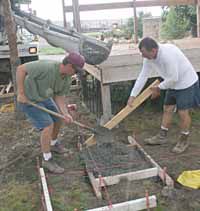| The Restaurant Tax Advisory Board allocated the funds for a new roof over the Main Street park stage in Helper. |
Citizens of Carbon County are part of the government of the community. Everyone who lives in the area either pays taxes or votes or both. Many of those same people own property and businesses, as well.
But few totally understand how their county government works and even fewer know why the various boards and committees that work under the umbrella of the county exist or how they operate.
It would seem to most people the county commissioners, along with the staff of the county, could handle all the kinds of issues that arise in a jurisdiction as small as Carbon. But part of a democracy is to allow the people to have a say on issues that affect them, and since it would be impossible to have every citizen vote or make decisions on every item that comes up, the county has formed various boards of people who live here to help make those decisions.
All together Carbon County has 10 different boards and committees that make recommendations to the commission on various kinds of issues. Generally these boards are specialized by area, with the citizens who occupy those seats having at least some knowledge of the areas they are dealing with.
Certain boards are more well known than others, largely because they make decisions about issues that either deal with large amounts of money or property.
In the past board vacancies have often been filled with names placed in front of the commission by the boards themselves. But in the last year the county commission has decided to advertise for all positions that come open on boards, so the maximum number of interested citizens can apply to serve.
Probably the most well know of the boards is the planning and zoning commission. This board meets once a month (first Tuesday of the month) on a regular basis. Their job is primarily to make recommendations based on the development code that has been set up by the county concerning specific planning and zoning requests by citizens or businesses.
They also deal with issues related to roads, trails, land use and even a few dealing with water. They are the group that certain kinds of industries must approach for conditional use permits.
As a group they make no final decisions on zoning and conditional use issues, but instead issue recommendations to the county commission which must make those final decisions, based on the planning commissions expert recommendation.
While planning and zoning commission meetings are open to the public to attend, they do not hold formal public hearings. That is done at the county commission level when an issue reaches that point in the approval process.
Presently there are seven positions on the planning commission. Two are from cities (Price City Councilman Richard Tatton and Helper City Councilman Robert Welch). Three are from the county at large (R.D. Campbell, Lynna Topolovec and Earl Gunderson). Another position is presently open and needs to be filled.
Finally one of the county commissioners sits on the planning commission. That is currently Mike Milovich.
Anyone who sits on this board must be a resident of the county, an owner of real property in the county and at least four of the members cannot hold any other public office or position.
Members of this board (with the exception of the county commissioner) get no compensation for performing their duties. Terms are for four years.
Another board that has a high profile is the Restaurant Tax Advisory Board. This board was formed in 1997 to recommend dispersal of monies from a special restaurant and lodging tax the commission put in place to provide funds for various kinds of tourism related activities.
The board has to have at least five members (although presently it has more than that) who are residents of the county and represent certain kinds of local industries and organizations. Members can be drawn from the lodging industry, the restaurant industry, recreational facilities, convention facilities, museums, cultural attractions or other tourist related businesses.
Money that the board recommends be granted cannot be given to for profit or non-profit organizations, but can only be granted to governmental organizations (such as the cities) or other public entities.
The members of this committee consist of Chairman Lee Breinholt, Pam Miller, Sam Farlaino, Harvey Howard, Angelo Kiahtipes, Charlie Phillips, Keith Mason, Ellis Pierce and Glenn Wells.
Those on this board serve for two year terms and get no compensation for their service. They meet quarterly for funding decisions, more for planning
“One of the things we are trying to do with this committee is to be sure that the funding we give to those who request it is that the funds are actually growing new things here in the county rather than acting as maintenance funds,” says Breinholt.
Editors note: This is the first in a series of four articles discussing the various boards and committees that operate within Carbon County government.

